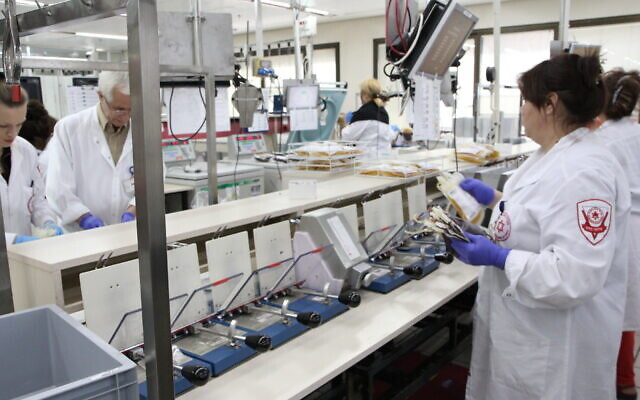Blood
With COVID cases on the rise, Magen David Adom asks public to donate plasma
As COVID cases rise again and new variants emerge, Magen David Adom’s national blood bank service is calling on generally healthy people who have been ill with COVID in the last three to four months to donate plasma. The blood component is needed for antibody treatment for patients who contract the virus and become seriously ill or are in danger of deteriorating because of a suppressed immune system.
Only people who confirmed they had COVID by doing a home test may donate. Donation is also restricted to men and women who have never been pregnant, as certain antibodies that often develop in pregnancy can be detrimental to the recipient of a plasma transfusion.
In addition, MDA is asking only for plasma donors who have fully recovered from COVID at least two weeks before their donation.
“We need to ramp up our supply of plasma so that we have enough for every COVID patient who needs it,” said Prof. Eilat Shinar, head of MDA Blood Services.
MDA has an inventory of antibodies from plasma donations that are effective against earlier manifestations of the virus, including the original SARS-CoV-2, and the Delta and the original Omicron variants. It now needs a supply of antibodies for the newer variants that emerged and became predominant over the summer, such as XBB, EG.5 (Eris), and BA.2.86 (Pirola).
Plasma is the largest component of blood, making up around 55 percent of its content. When separated from the rest of the blood, plasma is a light yellow liquid. It carries water, salts, and enzymes to where they are needed around the body. It also contains antibodies, coagulation factors, and albumin proteins.
MDA collects and processes 40,000-50,000 units of plasma per year for use in patients with severe bleeding. This plasma is separated out of whole blood donations and can be frozen for up to one year.
Blood plasma is processed by Magen David Adom staff. (Courtesy of Magen David Adom)
In contrast, the plasma required for COVID patients is extracted from patients hooked up to a machine that performs plasmapheresis, a process in which blood is removed from the body, the plasma is separated out and the blood cells are returned to the donor — all in one sitting.
“Once the donor is hooked up to the machine, the process takes about half an hour to extract three units (about 600 milliliters) of plasma,” Shinar said.
The COVID antibodies in the plasma are then separated out, concentrated, and stored in small bottles to be administered to patients who need them.
“This is a proven treatment in other diseases, as well. Ready-to-use natural antibodies extracted from plasma donation have been used in treating Ebola, for example,” Shinar said.
She further explained that early in the COVID pandemic in April 2020, Israeli health authorities devised a protocol whereby two treatments of COVID antibodies from plasma donations were administered to patients on two consecutive days.

Blood is donated in a Magen David Adom mobile blood donation unit. (Courtesy of Magen David Adom)
“The idea was to give this to [hospitalized] patients were were showing a deterioration in their condition but were not yet intubated and on artificial ventilators — in other words, before it was too late,” Shinar said.
She cited a study of 3,000 such Israelis that showed that 49% of those given the antibodies did better than those who did not.
“Another study on 33,000 people with COVID done at the Mayo Clinic showed a similar result,” Shinar added.
With hospitals calling MDA asking for updated COVID antibody supplies, it became clear that the blood services needed somewhere between 60 to 100 units of plasma total from eligible donors with various blood types to be in a good position as the expected “flurona” (combined flu and COVID) season begins.
At this point, the Health Ministry has not resumed tracking the extent of COVID in the community or mandating testing or isolating. Hospitals are also not performing PCR testing on all hospitalized patients, and plasma is not being tested by health authorities for exactly which antibodies it contains.

The Marcus National Blood Services Center in Ramle. (Courtesy of American Friends of Magen David Adom)
When asked whether the plasma donations will be effective if currently there is no matching of patients to donor antibodies in terms of virus variant, Shinar said that donating is still very important because there is at least a 50% chance that the antibodies will help in curing the patient.
“It’s better than not trying,” she said.
The plasma, which is processed in MDA’s newly minted Marcus National Blood Services Center in Ramle, can be donated at MDA locations in Jerusalem, Haifa, Beersheba, and elsewhere.
Prospective donors should contact MDA blood services by phone to make an appointment.

